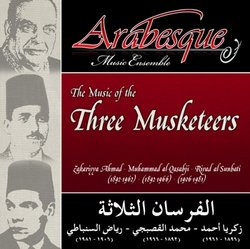| All Artists: Arabesque Music Ensemble Title: The Music of the Three Musketeers Members Wishing: 0 Total Copies: 0 Label: Xauen Music Release Date: 1/1/2008 Genre: International Music Style: Middle East Number of Discs: 1 SwapaCD Credits: 1 UPC: 718122826001 |
Search - Arabesque Music Ensemble :: The Music of the Three Musketeers
 | Arabesque Music Ensemble The Music of the Three Musketeers Genre: International Music
The Music of the Three Musketeers (al-fursan at-talatha) features three of the composers who wrote music for the legendary Egyptian vocalist Umm Kulthum: Zakaria Ahmad, Muhammad al-Qasabji, and Riyad al-Sunbati. The Arab... more » |
Larger Image |
CD DetailsSynopsis
Product Description The Music of the Three Musketeers (al-fursan at-talatha) features three of the composers who wrote music for the legendary Egyptian vocalist Umm Kulthum: Zakaria Ahmad, Muhammad al-Qasabji, and Riyad al-Sunbati. The Arabesque Music Ensemble (formerly the Chicago Classical Oriental Ensemble) is joined by vocalist Youssef Kassab. The ensemble has garnered critical acclaim, with praise for its precise rhythms and perfect intonation; (Washington Post) as well as its rich textures and musical versatility (Los Angeles Times). The Chicago Reader has asserted, the outstanding group brings a historical authenticity to the material and plays it with crackling precision. Similar CDs
|
CD Reviews"Lush, Languid Arab Music" -Chicago Tribune critic H. Reich B. Evans | Chicagoland | 02/10/2008 (5 out of 5 stars) "According to the booklet accompanying the CD, "the phenomenal success" of Egyptian songstress Umm Kulthum (also Om/Oum Kalsoun) in the 1930s and '40s was due in no small part to three men, later dubbed "Musketeers," who "knew how to compose for her in a way subsequent composers could not." Performing seven of their compositions is the Arabesque Music Ensemble, a relatively new group that is "dedicated to preserving the heritage of classical oriental music from the Arab, Turkish and Armenian traditions."
In his glowing 2/1/08 review of THE MUSIC OF THE THREE MUSKETEERS, Chicago Tribune music critic Howard Reich added to the well-deserved accolades the ensemble has received: The "incantatory vocals and lush intrumentals of [this recording] represent practically the antithesis of Western music, in that this music doesn't rush to climaxes or unfold to a rhythmic pulse. Instead, its sinuous melodies unfold unhurriedly, using exotic scales and 'bent note' pitches unfamiliar to most Western ears." On the basis of Reich's review, I not only ordered the CD but also made plans to hear the ensemble perform it live in what Reich noted was a "reverberant hall ideally suited for these sounds." Though a day-long blizzard cancelled those plans, my disappointment was short-lived. The very next day the CD arrived, and as it played, I was transported back to the centuries-old Cairo coffeehouse where I first heard such music. Only this time, thanks to the booklet, I had translations of the lyrics, which are the verses of two great Egyptian poets. Note: Though I (and H. Reich) highly recommend this CD and its male vocalist, you may wish to consider some of the recordings of the incomparable Kulthum that are still available. See, for example, the CD The Classics and Umm Kulthum: A Voice Like Egypt, a DVD documentary narrated by Omar Sharif. Note: The Arabesque Music Ensemble was formed in 2003 as The Chicago Classical Oriental Ensemble. Still so named in 2006, it released The Songs of Sheikh Sayyed Darweesh: "Soul of a People". Darweesh is the Egyptian musician who greatly influenced al-Qasabji and al-Sunbati, the two Musketeers who did experiment with Western music. (In contrast, showing "hardly any Western influence" are the compositions of the third, Z. Ahmad, who some consider "the greatest composer of colloquial Egyptian music that Umm Kulthum worked with.")" |

 Track Listings (7) - Disc #1
Track Listings (7) - Disc #1